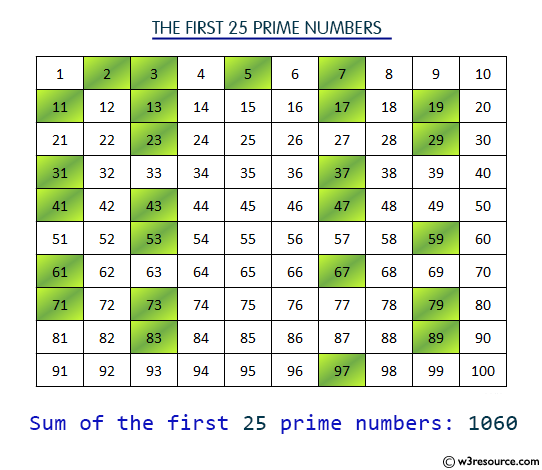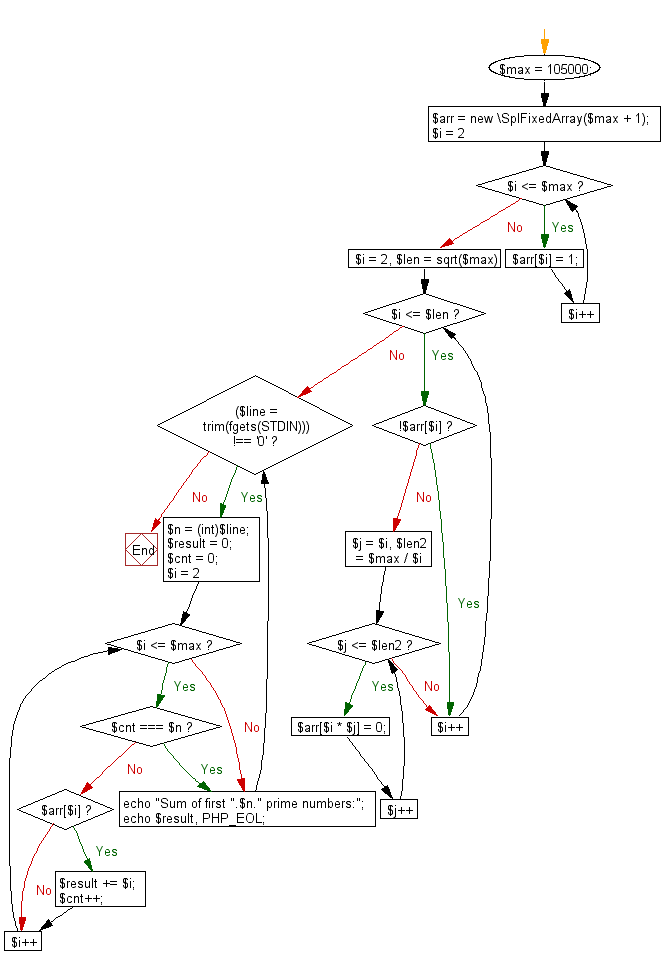PHP Exercises: Compute the sum of first n given prime numbers
PHP: Exercise-65 with Solution
Write a PHP program to compute the sum of first n given prime numbers.
Input: n ( n ≤ 10000). Input 0 to exit the program.
Pictorial Presentation:

Sample Solution: -
PHP Code:
<?php
$max = 105000;
$arr = new \SplFixedArray($max + 1);
for ($i = 2; $i <= $max; $i++) {
$arr[$i] = 1;
}
for ($i = 2, $len = sqrt($max); $i <= $len; $i++) {
if (!$arr[$i]) {
continue;
}
for ($j = $i, $len2 = $max / $i; $j <= $len2; $j++) {
$arr[$i * $j] = 0;
}
}
while (($line = trim(fgets(STDIN))) !== '0') {
$n = (int)$line;
$result = 0;
$cnt = 0;
for ($i = 2; $i <= $max; $i++) {
if ($cnt === $n) {
break;
} elseif ($arr[$i]) {
$result += $i;
$cnt++;
}
}
echo "Sum of first ".$n." prime numbers:";
echo $result, PHP_EOL;
}
?>
Sample Input:
25
0
Sample Output:
Sum of first 25 prime numbers:1060
Flowchart:

PHP Code Editor:
Have another way to solve this solution? Contribute your code (and comments) through Disqus.
Previous: Write a PHP program to replace a string "Python" with "PHP" and "Python" with " PHP" in a given string.
Next: Write a PHP program that accept a even number (n should be greater than or equal to 4 and less than or equal to 50000, Goldbach number) from the user and create a combinations that express the given number as a sum of two prime numbers. Print the number of combinations.
What is the difficulty level of this exercise?
Test your Programming skills with w3resource's quiz.
PHP: Tips of the Day
How to Sort Multi-dimensional Array by Value?
Try a usort, If you are still on PHP 5.2 or earlier, you'll have to define a sorting function first:
Example:
function sortByOrder($a, $b) {
return $a['order'] - $b['order'];
}
usort($myArray, 'sortByOrder');
Starting in PHP 5.3, you can use an anonymous function:
usort($myArray, function($a, $b) {
return $a['order'] - $b['order'];
});
And finally with PHP 7 you can use the spaceship operator:
usort($myArray, function($a, $b) {
return $a['order'] <=> $b['order'];
});
To extend this to multi-dimensional sorting, reference the second/third sorting elements if the first is zero - best explained below. You can also use this for sorting on sub-elements.
usort($myArray, function($a, $b) {
$retval = $a['order'] <=> $b['order'];
if ($retval == 0) {
$retval = $a['suborder'] <=> $b['suborder'];
if ($retval == 0) {
$retval = $a['details']['subsuborder'] <=> $b['details']['subsuborder'];
}
}
return $retval;
});
If you need to retain key associations, use uasort() - see comparison of array sorting functions in the manual
Ref : https://bit.ly/3i77vCC
- New Content published on w3resource:
- HTML-CSS Practical: Exercises, Practice, Solution
- Java Regular Expression: Exercises, Practice, Solution
- Scala Programming Exercises, Practice, Solution
- Python Itertools exercises
- Python Numpy exercises
- Python GeoPy Package exercises
- Python Pandas exercises
- Python nltk exercises
- Python BeautifulSoup exercises
- Form Template
- Composer - PHP Package Manager
- PHPUnit - PHP Testing
- Laravel - PHP Framework
- Angular - JavaScript Framework
- Vue - JavaScript Framework
- Jest - JavaScript Testing Framework
